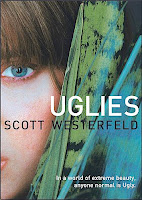Uglies (2005)
By Scott Westerfeld
Simon Pulse / Simon & Schuster
A friend has convinced me to try my hand this year for the first time at writing children's literature; but I don't actually know anything about children's literature, so am starting the process among other ways by first reading a stack of popular books that have been recommended to me. Today's title is my fifth of the contemporary "superstar" young-adult (YA) books out there, a whole series of post-9/11 titles now in my reading list that have each sold millions of copies, usually without most of us adults being any the wiser; in particular it's the 2005 science-fiction juggernaut Uglies, by an author named Scott Westerfeld who was already a famed writer of adult SF before penning this, and which in reality is merely part one of an insanely popular series currently four books long.
And man, it's easy to see why people go so nuts about this book once you read it yourself, because it's a stunner when compared to a lot of other YA novels out there -- much more sophisticated than the average teen book, presenting much more subversive material than normal, a post-apocalyptic morality tale that effortlessly blends far-future hard-science concepts with the reality of our current plastic-surgery, Paris Hilton, TMZ wasteland days. Taking place several hundred years after an unnamed apocalyptic event, Uglies imagines a new type of society all green and shiny, where cutting-edge science is used to create a self-sustaining metropolitan area that largely takes care of itself, leaving its inhabitants free to essentially party 24 hours a day; and in an effort to erase the looks-based biases and open racism of past civilization (which Westerfeld hints is what caused the unnamed apocalypse in the first place), at the age of 16 all citizens go through a complicated series of plastic surgeries so that every single person ends up looking like a gorgeous, golden-skinned supermodel. Such a society, then, breaks down into what they call "littlies" (small children), "uglies" (those going through puberty, and who live in lower-class barracks away from the main city), then "pretties" once coming of age, further broken down into categories of "young," "middle" and "old" pretties (each requiring a new round of surgeries).
Without going into too many specifics, then, the actual plot of Uglies sort of mirrors the classic '70s tale Logan's Run, the story of one 15-year-old ugly who has accidentally gotten wind about a supposed sanctuary of sorts, a semi-mythical community of non-ops who live as adult uglies out in the crumbling post-apocalyptic ruins of what sounds like might be San Francisco or perhaps Seattle. And that of course gets to the heart of this book's brilliance; because in a world full of environmentally-friendly, crime-free cities packed with supermodels, none of whom ever have to work a day in their life, why would one be complaining in the first place? Aren't we as a race ultimately striving for some kind of version of this right now, after all? And Westerfeld's answer, of course, is that it's a society without free will, a society that never grows or changes precisely because there is no pain or learning, no hard lessons and no maturation process, with the whole thing actually held together through much more nefarious means than the general population even realizes; there's a very good reason, after all, that these various post-apocalyptic "pretty" cities maintain no contact with each other, a very good reason that there's a whole secret wing of these societies acting as a shadow government of sorts, the various revelations concerning which make up the action-packed plotline of this book's second half.
Like Cory Doctorow's Little Brother, this is one of those books that liberal, intelligent parents are going to love seeing their teens get into; because ultimately this book preaches a great message that too few teens get told these days, that it's always better to think for yourself and make your own decisions, no matter how tempting a bland, comfortable, unthinking middle-class existence of television and partying might seem at times. It's a giant book, almost 500 pages, and so are all the sequels, making it a good challenge for most teenage readers, something that feels like a real accomplishment when finishing, and I have a feeling is eventually going to take on a revered, highly influential place in the minds of the current generation of youth, when thinking back on these times twenty or thirty years from now. That's a nice thing to imagine, frankly, that a book like this might have much more of a future sway over our current generation of youth than every celebrity trainwreck and embarrassing reality show added together. More books like these, please, YA industry, and a little less sexy vampires!
Thursday, March 25, 2010
Subscribe to:
Post Comments (Atom)

No comments:
Post a Comment